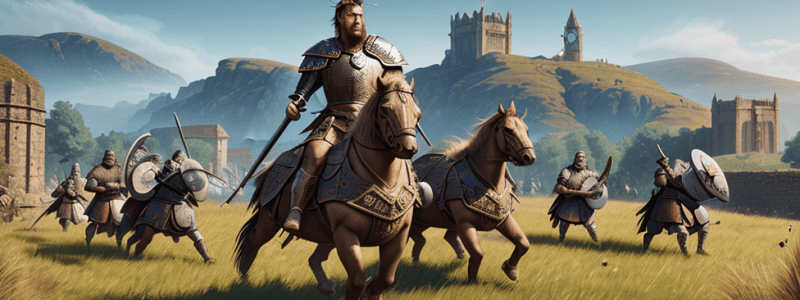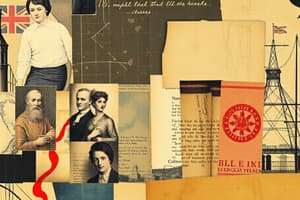Podcast
Questions and Answers
What was the purpose of wergild?
What was the purpose of wergild?
- To provide compensation for the family of a person killed or injured (correct)
- To determine the social status of individuals in medieval England
- To establish a system of punishment for crimes
- To redistribute land among the peasants
Where did the Angles, Saxons, and Jutes come from?
Where did the Angles, Saxons, and Jutes come from?
- Germany
- Spain
- France
- Scandinavia (correct)
Who owned most of the land in England in the 11th century?
Who owned most of the land in England in the 11th century?
- The Anglo-Saxon kings
- The Church (correct)
- The Norman conquerors
- The Roman Empire
When and how did the Romans take over Britain?
When and how did the Romans take over Britain?
What happened in Britain in the 8th and 9th centuries?
What happened in Britain in the 8th and 9th centuries?
Who was King Alfred and what did he do?
Who was King Alfred and what did he do?
What is the single most valued heroic type in Anglo-Saxon society?
What is the single most valued heroic type in Anglo-Saxon society?
What four virtues did the Anglo-Saxon heroic type embody that were important to their society?
What four virtues did the Anglo-Saxon heroic type embody that were important to their society?
What is a comitatus in Anglo-Saxon society?
What is a comitatus in Anglo-Saxon society?
What is mead in the context of Anglo-Saxon society?
What is mead in the context of Anglo-Saxon society?
How did the Germanic religious beliefs concerning an afterlife influence Anglo-Saxon warriors?
How did the Germanic religious beliefs concerning an afterlife influence Anglo-Saxon warriors?
What is an epic hero in the context of Beowulf?
What is an epic hero in the context of Beowulf?
What distinction does the poem Beowulf have in terms of literature?
What distinction does the poem Beowulf have in terms of literature?
When was the poem Beowulf actually written down? By whom? Where is the Beowulf manuscript today?
When was the poem Beowulf actually written down? By whom? Where is the Beowulf manuscript today?
What was the significance of wergild in Anglo-Saxon society?
What was the significance of wergild in Anglo-Saxon society?
Where did most of the towns in medieval England tend to be located?
Where did most of the towns in medieval England tend to be located?
Who were the original inhabitants of England before the arrival of the Angles, Saxons, and Jutes?
Who were the original inhabitants of England before the arrival of the Angles, Saxons, and Jutes?
What happened in Britain in 1066 that had a significant historical impact?
What happened in Britain in 1066 that had a significant historical impact?
Why did the Romans leave Britain during the decline of the Roman Empire?
Why did the Romans leave Britain during the decline of the Roman Empire?
What role did King Alfred play in English history?
What role did King Alfred play in English history?
What is the significance of wyrd in Anglo-Saxon society?
What is the significance of wyrd in Anglo-Saxon society?
What did the bards or scops create for Anglo-Saxon society?
What did the bards or scops create for Anglo-Saxon society?
What cultural values does an epic hero like Beowulf embody?
What cultural values does an epic hero like Beowulf embody?
What are the two most important influences on Anglo-Saxon literature?
What are the two most important influences on Anglo-Saxon literature?
What does the plot of an epic usually involve?
What does the plot of an epic usually involve?
What is a kenning in Anglo-Saxon literature?
What is a kenning in Anglo-Saxon literature?
What are the five standard features of the epic form according to Homer?
What are the five standard features of the epic form according to Homer?
What is considered the earliest surviving epic?
What is considered the earliest surviving epic?
What did the Anglo-Saxons bring to Britain?
What did the Anglo-Saxons bring to Britain?
What were the Germanic religious beliefs concerning an afterlife?
What were the Germanic religious beliefs concerning an afterlife?
Flashcards are hidden until you start studying
Study Notes
Wergild and Societal Structure
- Wergild was a system of compensation for wrongful acts, particularly involving injury or death, designed to prevent blood feuds.
- In the 11th century, most land in England was owned by the monarchy and nobility, particularly the King and his vassals.
Origins of the Angles, Saxons, and Jutes
- The Angles, Saxons, and Jutes originated from present-day Germany, Denmark, and the northern Netherlands.
Roman Occupation of Britain
- The Romans conquered Britain in AD 43, establishing control through military force and infrastructure development.
- Roman withdrawal from Britain occurred in the early 5th century due to the decline of the Roman Empire and internal pressures.
Historical Developments in the 8th and 9th Centuries
- The 8th and 9th centuries were marked by Viking invasions, leading to significant conflicts and settlement in Britain.
King Alfred's Contributions
- King Alfred, known as Alfred the Great, defended England against Viking invasions and promoted education and legal reform.
Anglo-Saxon Society and Heroic Values
- The most valued heroic type in Anglo-Saxon society was the warrior hero who exemplified bravery, loyalty, and honor.
- Four virtues embodying the Anglo-Saxon heroic type included bravery, loyalty, generosity, and courtesy.
Comitatus and Mead
- Comitatus refers to the bond of loyalty between a king and his warriors, emphasizing mutual obligations and honor.
- Mead is an alcoholic beverage made from fermented honey, often consumed during gatherings and celebrations.
Religious Beliefs and the Afterlife
- Germanic religious beliefs viewed the afterlife as a continuation of earthly life, motivating warriors to seek valor and glory in battle.
The Epic Hero and Beowulf
- An epic hero, like Beowulf, is characterized by extraordinary strength and courage, embodying the moral ideals of the society.
- Beowulf is distinguished as one of the earliest and most significant works of English literature.
Creation and Preservation of Beowulf
- The Beowulf manuscript was transcribed by an anonymous scribe in the late 10th or early 11th century.
- Today, the Beowulf manuscript is housed in the British Library.
Cultural and Historical Significance
- Wergild played a crucial role in Anglo-Saxon society by establishing a legal framework for reparation and conflict resolution.
- Most medieval towns in England were located near rivers, facilitating trade and transportation.
Pre-Anglo-Saxon Inhabitants and 1066 Impact
- The original inhabitants of England before the Angles, Saxons, and Jutes were the Romans, Celts, and various tribal groups.
- The Norman Conquest in 1066 significantly altered the political landscape of England, leading to feudalism.
The Role of King Alfred
- King Alfred's role in English history includes unifying disparate Anglo-Saxon kingdoms to resist Viking conquests and his emphasis on education.
Significance of Wyrd and the Role of Bards
- Wyrd, meaning fate or destiny, was a key belief influencing Anglo-Saxon views on life and valor.
- Bards or scops contributed to society by composing and reciting epic tales, preserving history and cultural values.
Cultural Values in Epic Literature
- An epic hero like Beowulf embodies cultural values such as courage, honor, and the importance of reputation.
- Two major influences on Anglo-Saxon literature include oral tradition and Latin literature.
Plot Structure and Literary Features
- The plot of an epic typically involves a hero's journey marked by trials, battles, and personal growth.
- A kenning is a metaphorical compound word used in Anglo-Saxon poetry to describe something, enhancing imagery.
Features of Epic Form and Historical Context
- The five standard features of the epic form include a noble hero, vast setting, deeds of great valor, involvement of supernatural forces, and elevated style.
- The earliest surviving epic is the "Epic of Gilgamesh," predating Beowulf and offering insights into early literature.
Anglo-Saxon Contributions and Religious Beliefs
- The Anglo-Saxons brought language, art, and culture to Britain, significantly influencing its development.
- Germanic beliefs regarding the afterlife emphasized honor in life, impacting warrior culture and societal values.
Studying That Suits You
Use AI to generate personalized quizzes and flashcards to suit your learning preferences.



